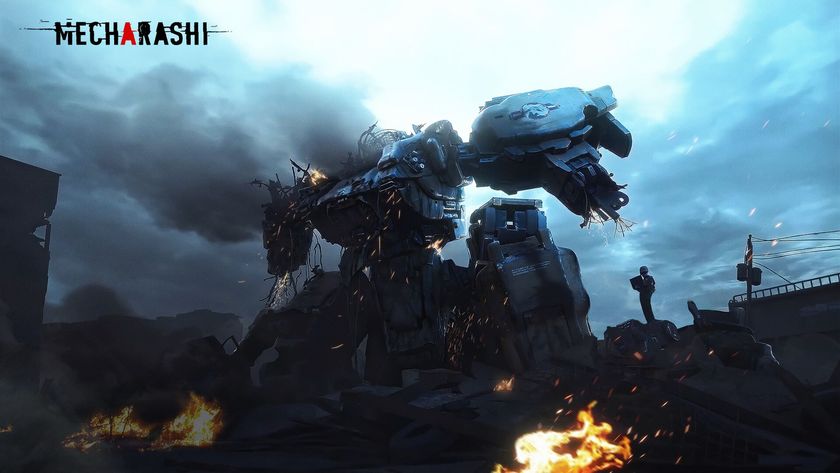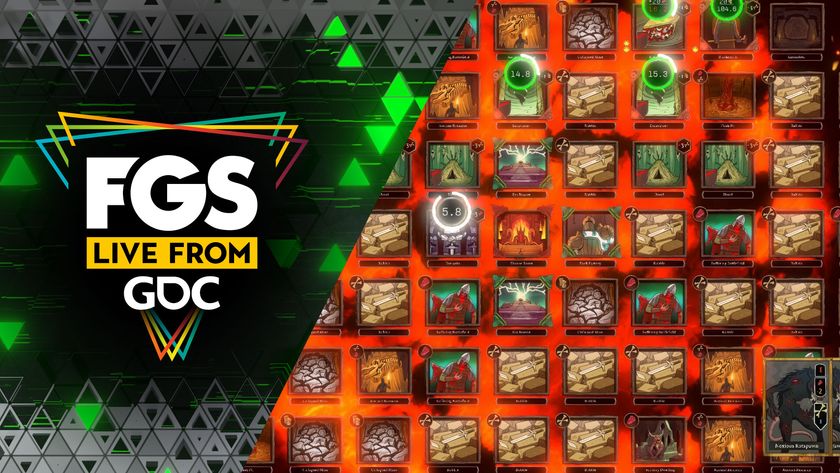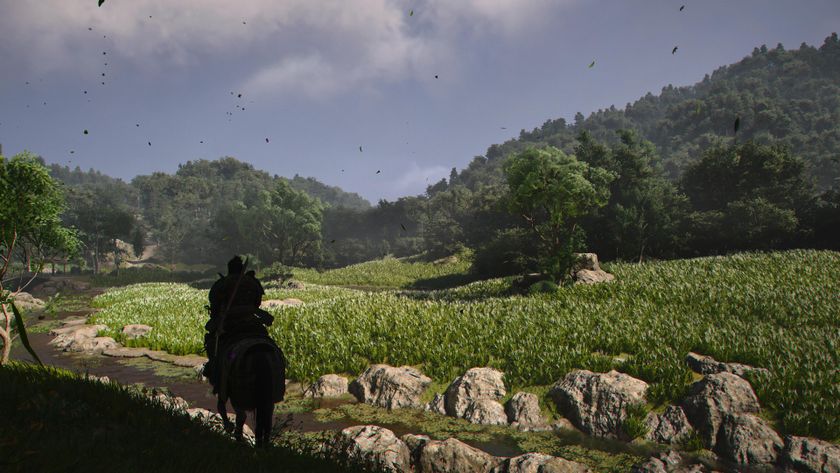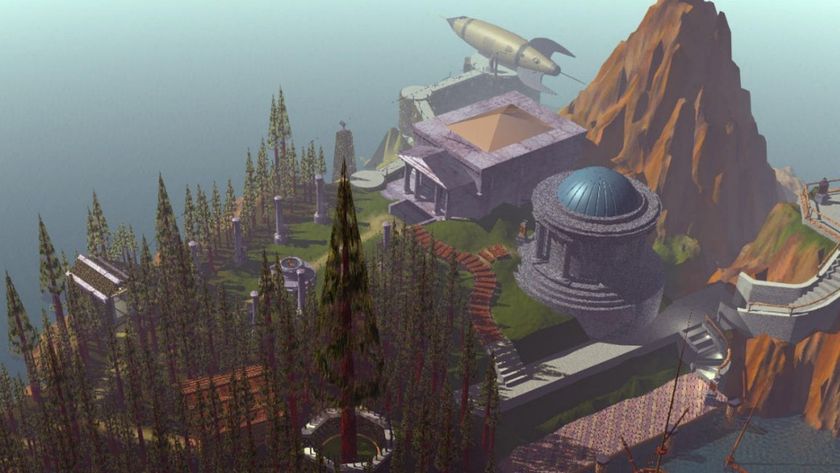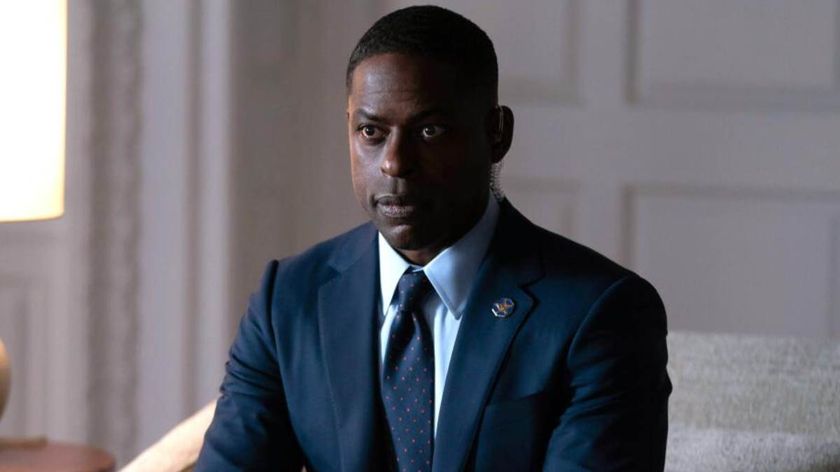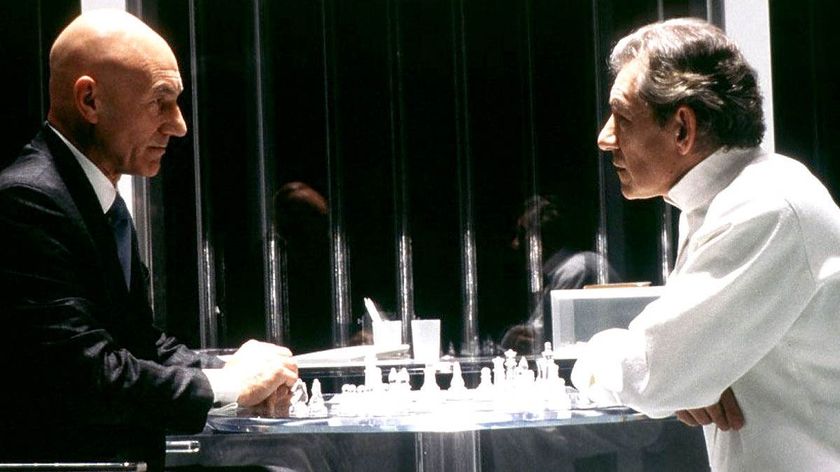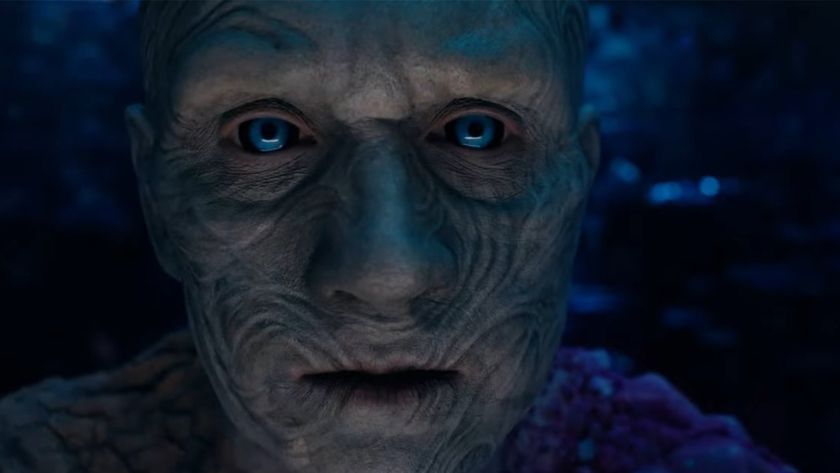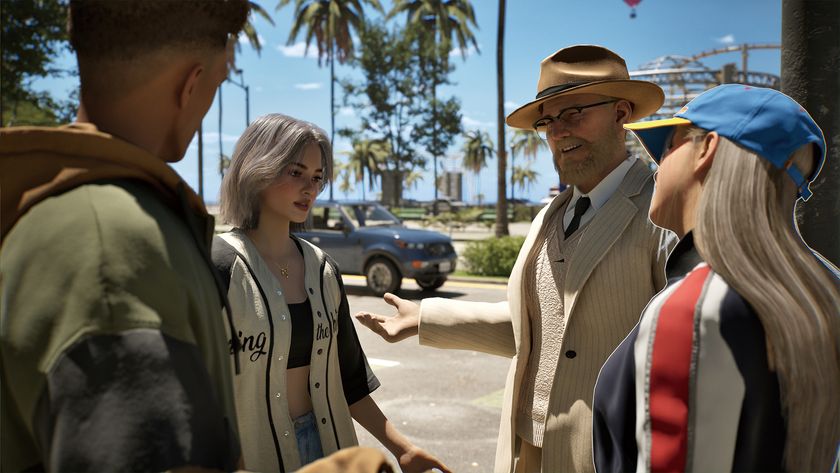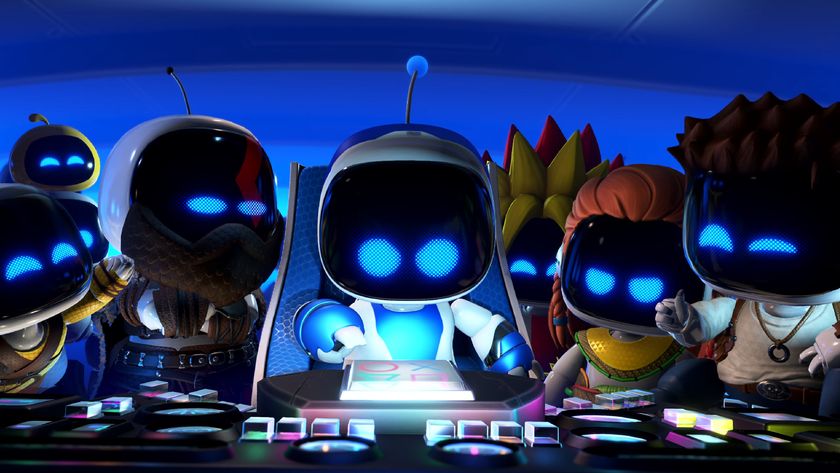Jake Solomon on his journey from underqualified graphics programmer to master strategist
From Civ 3 to XCOM and Marvel's Midnight Suns, Jake Solomon shares his thoughts on his extensive back catalog
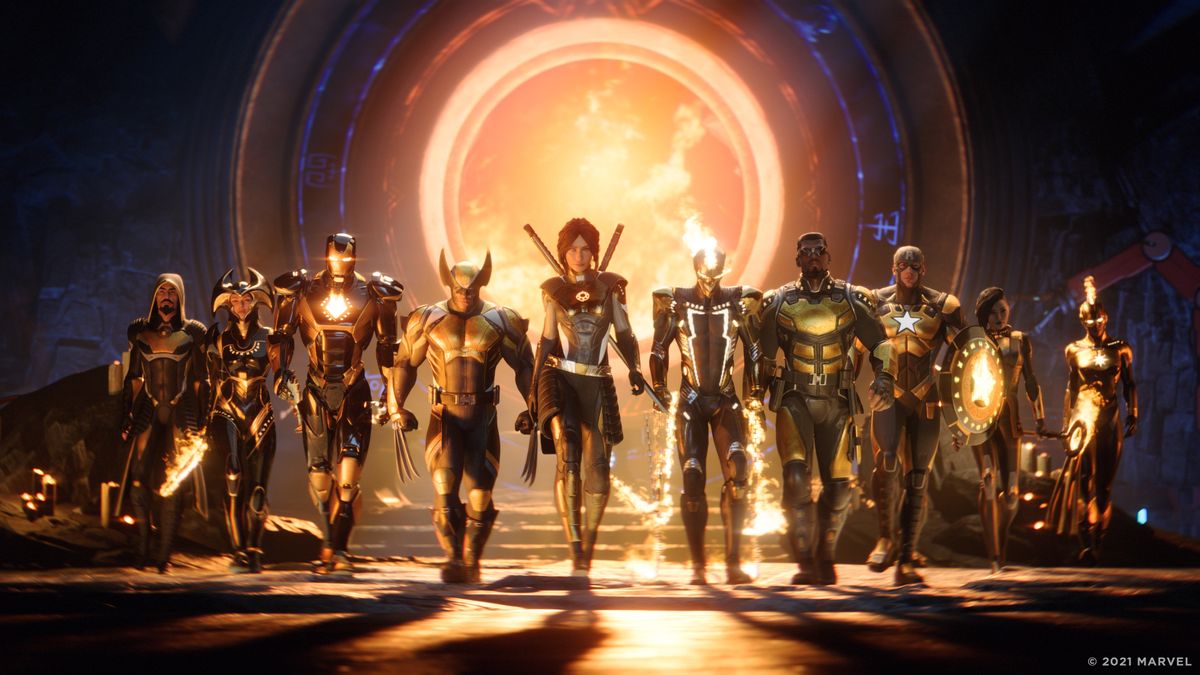
XCOM soldiers bounce from cover to cover, clinching victory against superior odds through constant reassessment of the field. They remain forever alive to the possibility that a more advantageous position may lie just beyond the horizon. You do wonder, however, whether all that relocation might have been unnecessary, given that XCOM designer Jake Solomon has achieved so much by staying put. In a tenure at Firaxis Games that spans well over 22 years, Solomon's most recent contribution includes directing Marvel's Midnight Suns.
"I've been married for 21 and a half years," he says. "My truck is 12 years old. Luckily, I don't have that bug of having to see the other side of the hill – I'm like: 'This side of the hill is great. Let's just stay here. There could be wolves over there – I don't know.'"
Out of the pan

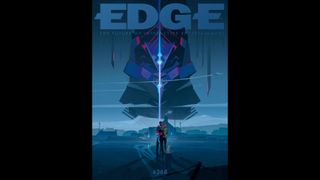
This feature originally appeared in Edge magazine. For more in-depth features interviews delivered to your door or digital device, subscribe to Edge magazine.
Solomon's studio loyalty is owed to X-Com: Enemy Defense (aka Enemy Unknown), which was published and co-developed by Sid Meier's Microprose. When Meier left to form Firaxis with Jeff Briggs and Brian Reynolds, Solomon was one of many fans who transferred his allegiance to the new company. It was the only studio he ever applied to work at, and Meier has since become his mentor – even though, by his own admission, Solomon's never been a "huge Civ guy". Instead, the designer has only ever had eyes for X-COM, which won him over with its cold, cruel simulation.
"It was the first game I'd ever played where it felt like the engine would just go on running forever, like it didn't care if the player was still there," he says. "It had its own rules that to me were inscrutable, but the deal was that it was a real world." In the early days, he had dreamed of continuing X-COM's legacy. Instead, he ended up expanding it. Solomon has been the man to bring turn-based tactics to a mainstream western audience for the first time. He has done so through a commitment to clarity, and an ability to identify and double down on discrete, binary choices amid a mass of granular systems.
"It's almost memeable now, but I loved how in the Telltale games they were like, 'So-and-so will remember that,'" he says. "That's fantastic. Put that shit on-screen. That's the kind of guy I am." Over his two decades in the business, Solomon has worked almost exclusively on turn-based strategy games. In fact, he doesn't think he could make the highly scripted adventures typical of AAA productions, preferring the endless possible permutations thrown up by geoscapes and procedural maps. It's their capacity for surprise that means he's never tired of his own creations. "XCOM in some ways feels like cheating as a designer," he says, "because I could play that game for hundreds of hours. I've always been very thankful for that.
Here, Solomon himself talks us through his Firaxis game development journey – from Civ 3 to Midnight Suns – in his own words.
Civilization 3
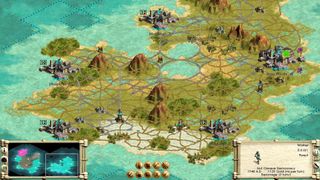
Developer: Firaxis Games
Publisher: Infogrames
Format: PC
Release: 2001
Sign up to the 12DOVE Newsletter
Weekly digests, tales from the communities you love, and more
Firaxis was the only game studio I interviewed at. I had already accepted a job – I was going to be a business consultant. They'd already given me a signing bonus. Sid [Meier] was working on a game called Dinosaurs, which never actually came out. He had me look at it and tell him what I thought. Back then, game developers were rockstars. At the end of the day they offered me the position, and they were gonna pay me way less than I was going to make as a business consultant. But I didn't care, obviously. I had spent some of the signing bonus and I was so naive, I figured they'd be like, "We get it". Instead they were like, "No, you have to pay back the fucking signing bonus".
The company was very small at that time, maybe 20 or 25 people, because half had left with Brian Reynolds to go start Big Huge Games. It was a pure stroke of luck that they would hire a guy out of college. Soren Johnson and I started the same day, with another guy named Mike Breitkreutz. We were their programming department because everybody else had left, and we didn't even know enough to know that was insane. I was technically a graphics programmer, but back in those days I was woefully under-qualified to do that. I worked on Civilization III for a year and a half. It was a crazy, crazy time, and a lot of fun. I'm thankful that I was so naive, because I think if I'd known how little I knew, I would have been a lot more intimidated.
Sid Meier's Sim Golf
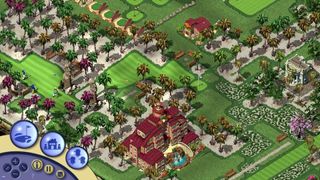
Developer: Firaxis Games
Publisher: Electronic Arts
Format: PC
Release: 2002
[Sid Meier's] Dinosaurs wasn't working. It just wasn't that fun. And so Sid went away one weekend and came up with a new idea. He had this game that was about building golf courses. I wasn't a golfer – none of us played golf except for Sid – but you could tell already that it was pretty fun. I finally got to do 3D graphics, because I wrote the terrain system – you could raise and lower it. It was just [called] Golf, and then somehow it got tied into The Sims because it was published by EA. That was the first time I'd ever worked with Sid. We were the only two programmers on that game, so that's how I started to understand the way that his brain works. Sid made mostly top-down games with a lot of the same elements, but he did whatever he wanted if he had an idea he thought would be cool as a game. He was playing golf a lot, so he was like, "I'm gonna make a game about golf". As revenue and cost started to grow, risk aversion became more important and more present. And then it became like, "There's an audience for this, so why don't we not do the dinosaurs, Sid? Let's drop the dinosaurs".
Sid Meier's Pirates
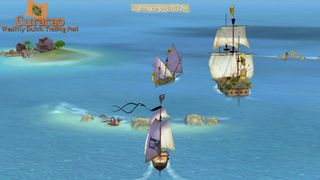
Developer: Firaxis Games
Publisher: Atari
Format: PC
Release: 2004
What I remember is that Sid wasn't doing Pirates at first. Somebody else was doing it, but it wasn't really working out all that well. None of us were happy with it. It was another case where Sid went away for the weekend and came back, and he had a version of Pirates using all the assets we had. We played it and were like, "Obviously this is what we should be doing". So Sid took over. That was the end of me doing graphics – I did a little bit of that, and then I started transitioning into gameplay programming. And it was right around that time that I first pitched XCOM, and got to do a prototype.
XCOM Prototype
Developer: Firaxis Games
Sid and the company gave me and another programmer six months. I wasn't even really a designer at this point, I just really wanted to make XCOM and we had the license to it. When I got the opportunity I still had this arrogance that it was gonna be great. I was using old Unreal Engine assets and so unqualified. Instead of focusing on the really hard stuff, like how to make it fun, I focused on an inventory system. By the end of the six months, you could walk these guys around, they had time units, they could shoot.
There was a fully fleshed-out inventory system, for fuck knows what reason. It was absolutely terrible. It was just a classic case of overengineering. It looked cool, for what it was, but it was no fun at all. We showed it to the company and everybody was very nice about it. But I was relieved. I was like, "Obviously I've done a terrible job. I'm no good at this". And so I joined Sid on Civilization Revolution. But what had happened was that, [by getting] my shot at making that XCOM prototype so early, I did get the bug for design.
Civilization Revolution
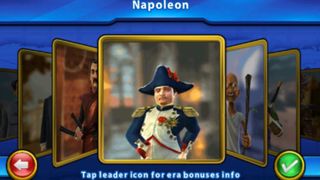
Developer: Firaxis Games
Publisher: 2K Games
Format: Xbox 360, Nintendo DS, iOS, PS3, Windows Phone
Release: 2008
I was still stung that I'd done such a poor job on the XCOM prototype. It was embarrassing and humbling. But it was a real opportunity. I learned all the stuff that I didn't know, and wanted to do a better job of it. Then I went to work with Sid again on Civilization Revolution, but this time with very wide eyes. I watched and listened and talked to him all the time. Because I was like, 'How the fuck does he do it in a weekend? Why is he so good at doing this thing I couldn't do in six months?' Here's one of the best people to ever do it, and I had not been humble enough to take advantage of that before. I moved into this role where I worked very closely with Sid. He would design something, and I was the go-between for him and the engineering team. He would want things to work a certain way, and the engineers wouldn't understand why, because it would make programming the engine hard. I could mediate between the two and say, "Well, it's really important because of this gameplay reason".
I was so interested now in how Sid worked, I was his advocate to the team. I was playing the game constantly, just like Sid was. And really, that's the most important thing. You've gotta eat your own cooking. You've got to play it, no matter what state it's in, then think about what's bad about it, and try to make it better the next day. What was it like to streamline Civilization for consoles? I was never a huge Civ guy, and I think that helped me. There were a lot of designers who contributed to what it is today, from Brian Reynolds to Soren Johnson, but Sid made it, and Sid was then able to distill it. For me, that was definitely my favorite Civ I had played at that point, because it was so distilled, and it was really neat to see him do that. I'm 100 per cent a designer [today] because I worked with Sid on Civilization Revolution and watched how he worked. Sid deserves to have an ego, but he doesn't. He just wants to make the game better. He'll listen to feedback and accept it as fact. That has always steered me right.
XCOM: Enemy Unknown
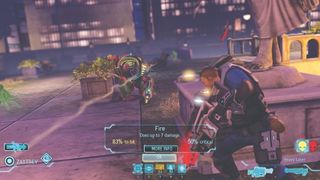
Developer: Firaxis Games
Publisher: 2K Games
Format: Xbox 360, Android, iOS, PC, PS3, PS Vita
Release: 2012
Sid advocated for me after we did Civ Rev and the question was: what's next? He was like, "I think Jake deserves a chance to try XCOM again". I'm very thankful for that. You have the setting, and you know what you want the player experience to be. But constructing all the elements of the systems to work with each other and produce the player experience you want is enormously complex. I had no experience of system design in that regard. I'd seen Sid do it but I'd never done it myself. We spent the first year, at least, working on a prototype that looked pretty cool but was very much the original Enemy Defense. I'd taken that and then piled all these systems on top of it – classes, different weapons. For people who were familiar with the original game, it was awesome. For everybody else, it was the most complicated spreadsheet thing they'd ever played. The reaction when everybody played it was like, "Oh no, this is not good".
The feedback was pretty unequivocal, and it was so disheartening and deflating, because I knew they were right. It's hard to overstate how difficult that period was, because it felt like I didn't know what I was doing. I had to make it way more fun, and to make it more fun, it had to be a lot more straightforward. So then, in a panic, I stripped everything away. I came up with this prototype where every soldier had only one number to represent them, and the number encapsulated the tactical value of that soldier. When they were behind cover, it would go up, but that number also represented how much damage they would do. It was so simple, but it was already a little more fun. Then we went to two numbers: offense and defense. If you have a height advantage, your offensive number goes up. When you take cover, your defensive number goes up. When you're flanked, your number goes down. There are trade-offs, interesting decisions that players are making and consequences to those decisions. It was a long process from there, still years to go before we shipped it, but that was actually the basis of what our XCOM became.
Some people use this as a pejorative, but I've never taken it that way – I'm much more of a boardgame-type designer than [X-Com creator] Julian Gollop is. I don't typically play a lot of other videogames for inspiration, but I do play boardgames, or I'll read the rulesets. The best boardgames, like Pandemic and Forbidden Island, have an economy of information. I love that as a player and a designer. I gravitate towards showing it to the player, putting the numbers front and center: this is the choice, this is the consequence. The only way you can inflict meaningful loss on the player is if they can look at what happened and go, "I see how I've done this to myself". They knew the risk they were taking. XCOM pushed me even further into that player psychology.
XCOM 2
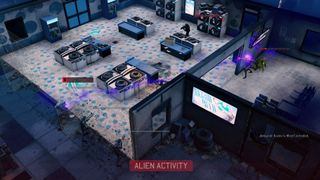
Developer: Firaxis Games
Publisher: 2K Games
Format: PC, PS4, Xbox One, Android, iOS, Nintendo Switch
Release: 2016
I think I made a mistake with XCOM 2, which I'm glad paid off. We were very happy with Enemy Unknown, but I had only ever designed that, and had no idea how much XCOM 2 should change. I was like, "The whole strategy layer is going to be very different. We're going to have base building. I want random, procedural maps". We had all these big changes, and because of that, XCOM 2 was difficult. The kernel of the idea – that the aliens won – came from Ken Levine. I stole it from him. We're good friends, and Ken is a very big XCOM fan. He was like, "Take it, use it". Having a strong theme like that led to stuff like very basic stealth and hacking.
It was a huge project and took a really long time, a lot like Enemy Unknown. It had all these changes that weren't going well, and then of course came together. It's funny because when I first started designing XCOM 2 we had the world with all these systems going on and the threat level rising, and aliens that were going to start catching on to your revolutionary activities. And I always end up cutting those because it's not clear enough to me. Again, that comes from Sid, who has a phrase that has always stuck with me: "Is the designer having fun, or is the player having fun?" It's a very good question to always ask yourself. War Of The Chosen, the expansion, in some ways was my favorite. I loved going back to the cities. It's bloated – there's so much in it – but the dream I had when I was a kid of designing XCOM was of putting in all this stuff. With War Of The Chosen, XCOM 2 was the game I was aiming for in the very beginning. It feels complete to me – maybe over-complete. It was a very big swing, and I felt really good personally when we finished it.
Marvel's Midnight Suns
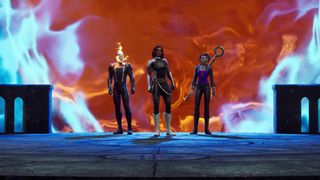
Developer: Firaxis Games
Publisher: 2K Games
Format: PC, PS4, PS5, Nintendo Switch, Xbox One, Xbox Series X and S
Release: 2022
I understand why players would treat XCOM like a puzzle. I think I backed myself into those interpretations. You get this confidence as a player that all the information's out there, but it's not all of it. The aliens are operating under AI that you don't understand. There really are some [losses] where you didn't do anything wrong, and actually you had a tough spot with some systemic elements. Midnight Suns is another step in the direction of telling the player as much as we can. Our enemies have a symbol on their flag that says, 'I am going to attack this hero next turn'. And your abilities say exactly what they're gonna do. We have one percentage [probability] element in the game, which is when you knock somebody into a hole or off a building, and that's fun because it's the only percentage in the game.
Everything else in Midnight Suns is very explicit. You can plan out actions in advance. Whether it's better or whether it's worse, I don't know. But it's been fun to work in that space as a designer. Is it less terrifying to go through a tough prototyping period now? Yes. I didn't know what this game was when I started. I've worked with most of my team for a very long time. They're all open to the idea of a lot of rapid change. Everybody, from design to art, they're used to this period of spinning things up.
There's a lot of creative freedom with my publisher, 2K, and ultimately Take-Two. When you're in a place as a designer of 'this isn't working', every show you watch, every game you play, you'll take any lifeline. I watched the Wonder Woman movie, and there's a scene where she jumps up into a sniper tower, kicking stuff and taking out four or five guys. And I was thinking, 'Man, that's what I would love for the game to look like. We need to get that feeling'. And I was playing Slay The Spire and thinking, 'Could I turn abilities into that?' It evolved from pulling everything in. This wasn't conscious, but Midnight Suns is basically the opposite of XCOM. You're not stuck on this map with terrifying aliens – the bad guys are terrified of you.
Mechanically, thematically, it's just XCOM completely reversed. Both XCOM and XCOM 2 were very fraught games as we were developing them. I wasn't confident in them. But with Midnight Suns, from our very first playable milestone years ago, we were like, "There's something pretty cool here". There were so many things wrong, but even from the beginning this game has felt different in the sense that it was fun pretty early. That's always a good feeling.
This feature first appeared in Edge magazine. For more fantastic in-depth features and interview, you can pick up a single issue over at Magazines Direct or subscribe.
Jeremy is a freelance editor and writer with a decade’s experience across publications like GamesRadar, Rock Paper Shotgun, PC Gamer and Edge. He specialises in features and interviews, and gets a special kick out of meeting the word count exactly. He missed the golden age of magazines, so is making up for lost time while maintaining a healthy modern guilt over the paper waste. Jeremy was once told off by the director of Dishonored 2 for not having played Dishonored 2, an error he has since corrected.

